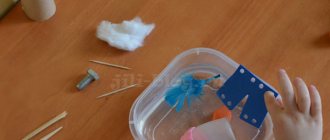SUMMARY of the parent meeting in the senior group on the topic “Modern ICT. Advantages and disadvantages"
Transcript
1 Municipal preschool educational institution, general development kindergarten “Berezka” Russia, Irkutsk region, Ust-Ilimsky district, Zheleznodorozhny village, st. Solnechnaya, 2. Phone: , email address: NOTES of the parent meeting in the senior group on the topic “Modern ICT. Pros and cons” prepared by: teacher Kashirina O.A, SZD r.p.zheleznodorozhny, 2017
2 With the right approach to studying on a computer, you can get the maximum benefit for your child’s development. B. Shlimovich Goal: to bring to the consciousness of parents the need to comply with the requirements and rules of health care when organizing the child’s interaction with ICT at home. Objectives: - to form parents’ ideas about the role, possibilities and ways of using ICT in teaching preschool children. — to develop an understanding of the importance of maintaining emotional contact with a child in order to avoid the development of computer addiction. — develop coordinated actions of the preschool educational institution and the family to properly organize the work of children with ICT. — offer practical advice on organizing safe interaction between a child and a computer. Preliminary work 1. Selection and analysis of literature on this topic. 2. Questioning of parents, analysis and generalization of the results obtained. 3. Preparation of memos on the topic of the meeting. Parent meeting plan 1. Emotional mood. Introductory speech by the teacher. Survey results. Distribution of parents into groups. (5 min.) 2. Parents’ work in groups, exchange of opinions (8 min.) 3. Classification of computer games, requirements for a preschooler’s game (3 min.) 4. Summing up the meeting. (2 minutes). Progress Shout loudly and in unison, friends, Do you all love your children? (yes) You came home from work and have no energy at all. Do you want to listen to lectures here? (no) I understand you. What should I do, gentlemen? Do we need to solve children's problems? (yes) Give me the answer then: Would you refuse to help us? (no) I’ll ask you one last thing: Will we all be active today? (yes) Opening speech by the teacher.
3 Modern information and communication technologies (ICT) have long and firmly penetrated into all spheres of human activity. They are used at work, at home, at school, and even in kindergarten. In many families, as soon as the child learns to sit, he is placed in front of the TV screen, which increasingly replaces grandmother's fairy tales, mother's lullabies, and conversations with father. The screen becomes the child's main educator. On the one hand, this makes our life much easier. In fact, the child does not pester, does not ask for anything, is not at risk, and at the same time receives impressions, learns something new, and joins modern civilization. On the other hand, we are forced to pay for this with the physical and mental health of our children. So do computers bring more benefit or harm to our children? And how to properly organize a child’s communication with a computer so that he does not become dependent on it? Today at the parent meeting we will try to answer these problematic questions and try to jointly develop rules for organizing children’s work on the computer. First, let's get acquainted with the results of a survey of parents on the use of ICT in their family. Summing up the results of the survey. So we see that a distinctive feature of the time in which we live is the rapid penetration of information technology into our lives. Nowadays, children are able to master the skills of working with various electronic computer innovations with enviable ease. But does this promote the development of a preschool child or, on the contrary, hold it back? Psychologists and speech therapists are sounding the alarm. In recent years, children have often experienced delayed speech development: they begin to speak late, speak little and poorly, and their speech is poor and primitive. Sitting in front of TV screens, the child does not learn to speak, but only learns to imitate sounds. Mastery of speech at an early age occurs only in live communication, when the child not only listens to other people’s words, but is also a participant in the dialogue: asks questions and answers. Increasingly, children are becoming increasingly incapable of imagination and creative activity. Their attention and ability to concentrate on any activity is impaired, and they have no interest in business. Many people find it difficult to perceive information by ear; they cannot retain a chain of several sentences in their memory or connect them with one meaning. Therefore, children are not interested in books and are bored. The formation of the child’s inner world, the formation of his personality occurs precisely in childhood and only in joint
4 life activities with adults. Lack of inner peace and spiritual emptiness give rise to childhood aggression and cruelty. All of the above, of course, does not mean to completely exclude modern ICTs from a child’s life. When used rationally, they can become tools that can develop a child’s creative abilities, his intellectual sphere, motor skills, and hand-eye coordination. The most important thing for us is that children do not become dependent on their “computer friend,” but value live, emotional human communication and strive for it. Let's try to identify all the “+” and “-” influences of ICT on the development of a preschool child: One group proves that the computer has a positive effect on the child, the other names the negative aspects of the influence of the computer on the child. Positive influence of the computer Negative influence of the computer üdevelopment of fine muscles of the hand, eye motor skills ügreat load on ücognitive motivation üconstrained posture üdevelopment of perseverance üdevelopment of osteochondrosis üdiseases of the joints of the hands üimproved memory, attention üOrientation in modern technologies ümental stress ücomputer addiction üquickly find the necessary information, therefore increasing ünervous emotional stress
5 free time ücomputer stress syndrome üchild forgets about the real world üreplacement of communication Scientists' studies show that a computer becomes understandable to a child from about 5 years old. If you decide that your child can use a computer at the age of three, you need to know the time limits. As children get tired in the process of communicating with a computer, the mental state and behavior of children also change in different ways: some develop uncertainty, anxiety, worsening mood, negative thoughts appear, fear of giving up other activities, and withdrawal. If a TV or computer does not interfere with a child’s normal development, communication with adults and peers, going for a walk, or doing physical exercise, then there is no reason to worry. But if it’s the other way around, it’s worth thinking about. It’s very important what’s inside your computer, what games your child plays. Conventionally, the entire variety of computer games can be classified as follows: Adventure or (adventure) the main help in these games is the discovery of various objects that the character encounters while traveling in a game space of impressive size. The role-playing goal of these games can be to find a person or a spell; here the main principle of a role-playing game is manifested - using the right character at the right time and in the right place. The strategy of these games is to manage resources, minerals, and troops. These games develop the child’s perseverance in planning his actions and train multifactorial thinking.
6 Games like “Kill them all” are purely entertaining. They develop motor functions, but poor cognitive ones, and at the same time questionable in terms of the development of thinking and, especially, moral education. They especially need a sense of proportion. Educational games that promote the cognitive development of preschool children and encourage independent creative play. Logic games develop logical thinking skills, these are puzzles, tasks for rearranging figures or drawing up a picture. Simulation games i.e. there is some kind of prefix: auto-aviation sports. In these games, great importance is attached to the realism of responsible reactions of the surrounding virtual environment, down to the smallest compliance with technical indicators. Graphic games related to drawing and design. In fact, it is very difficult to choose a computer game for a child: there are so many of them, and every manufacturer says that their game is the best! Experts have developed the requirements for a computer game for preschool children. If these requirements and rules are followed, the computer will not harm the child, and its benefits are obvious. - there should be no text information in the game - the font of the characters should be larger in size than the traditional one - the image on the screen should be large, without small distracting details - the pace of movements on the screen is not fast - it is undesirable to use a rating system in points - the program should have a logical completion, the house was built, a drawing was drawn, and hygienic requirements were developed that must be observed when organizing gaming activities. * a child can play at the computer no more than 15 minutes a day * it is better to play in the morning * during the week the child can work with the computer no more than 3 times * the room in which he works must be well lit * furniture is appropriate for the child’s height * distance from the child’s eyes to the monitor 60 cm;
7 *after playing, you must do exercises for your eyes * replace gaming activities with physical exercises Concluding the meeting, I would like to note once again that, undoubtedly, a computer is an effective means of child development. But in everything it is necessary to observe a sense of proportion. Many parents see nothing wrong with children spending a lot of time at the computer. Considering this type of leisure to be intellectual and useful, they only worry about problems with their posture or vision. However, excessive passion for computer games affects not only the child’s physical health, but also his psyche. The child develops a computer addiction. This can be avoided if you follow certain rules. And finally, I want to give you the “Prevention of Computer Addiction” and “Visual Gymnastics” handouts. End. REMINDERS To prevent computer addiction, psychologists advise the following: 1. Set a personal positive example. It is important that words do not diverge from deeds. And if a father allows his son to play no more than an hour a day, then he himself should not play for three or four. 2. Limit the time spent working with the computer, explaining that the computer is not a right, but a privilege, therefore communication with it is subject to parental control. It is impossible to sharply prohibit working on a computer. If a child is already prone to computer addiction, he can spend two hours on the computer on a weekday and three on a weekend, but always with breaks. 3. Offer other ways to spend time. You can make a list of things you can do in your free time. It is advisable that the list include joint activities (going to the cinema, going to nature, playing chess, etc.) 4. Use the computer as an element of effective education, as a reward (for example, for homework done correctly and on time, cleaning the apartment ). 5. Pay attention to the games children play, because some of them can cause insomnia, irritability, aggressiveness, and specific fears.
8 6. Discuss games with your child. Give preference to educational games. It is extremely important to teach a child to think critically about computer games, to show that this is a very small part of the available entertainment, that life is much more varied, and that games cannot replace communication. 7. If parents cannot cope with the problem on their own, it is necessary to contact psychologists.

